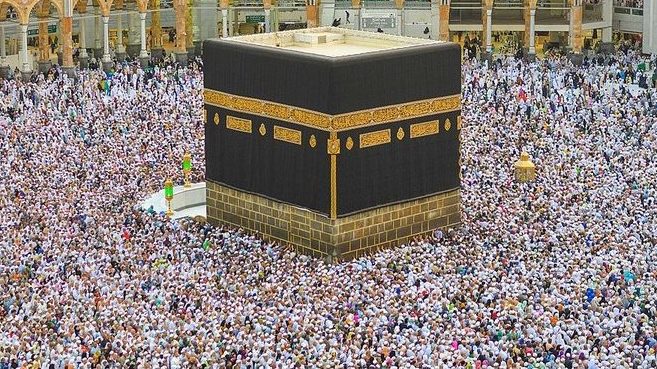Hajj After 2 Years of a Pandemic
Okaz, Saudi Arabia, July 7
After nearly two years in which the coronavirus pandemic spread across the world and shut down international borders, the Kingdom of Saudi Arabia decided this year to welcome pilgrims from across the world seeking to perform the hajj in Mecca. Of course, the decision to allow pilgrims to re-enter the country for the first time in two years wasn’t taken lightly; it was reached after a thorough study of the situation. Saudi authorities confirmed that the virus is currently under control, and that the precautionary measures that were implemented during the hajj period this year are expected to succeed in limiting potential risks. The Kingdom of Saudi Arabia has always been able to organize and host both the hajj and umrah with a huge number of visitors exceeding two million pilgrims each year. This experience, accumulated over decades, equipped authorities with extensive know-how in how to deal with all logistics pertaining to the pilgrimage, including health risks. The kingdom has spared no effort, time or money on preparing the infrastructure required to host pilgrims during the onset of a global pandemic, including through innovative solutions in transportation, hospitality and health care. As soon COVID-19 emerged and cast a dark shadow on the world, the kingdom rushed to implement all precautionary measures to contain the virus and prevent it from spreading. Among those decisions was reducing the number of pilgrims during the past two years and limiting the hajj season to internal pilgrims in the kingdom who were immune to the virus. As a precautionary measure, the kingdom has started receiving pilgrims from outside the kingdom to perform the rituals of umrah during the past months, and this year’s hajj season is the first season since the pandemic erupted in which the kingdom receives pilgrims from abroad. The kingdom’s ability to organize the hajj season efficiently and swiftly increases year after year. And still, the huge efforts and intensive preparations to reduce the risks associated with hajj this year deserve to be commended. These efforts started before the hajj season and continue well after hajj days are over. Certainly, good planning and carefully thought-out decisions are all essential factors in the system of success that the kingdom developed, especially in the field of emergency crisis management. The precautionary measures we follow every day inside and outside the holy sites give us more confidence in the kingdom’s ability to overcome challenges and manage the current hajj season with complete efficiency, God willing. – Muhammad Mufti (translated by Asaf Zilberfarb)
Give the gift of hope
We practice what we preach:
accurate, fearless journalism. But we can't do it alone.
- On the ground in Gaza, Syria, Israel, Egypt, Pakistan, and more
- Our program trained more than 100 journalists
- Calling out fake news and reporting real facts
- On the ground in Gaza, Syria, Israel, Egypt, Pakistan, and more
- Our program trained more than 100 journalists
- Calling out fake news and reporting real facts



